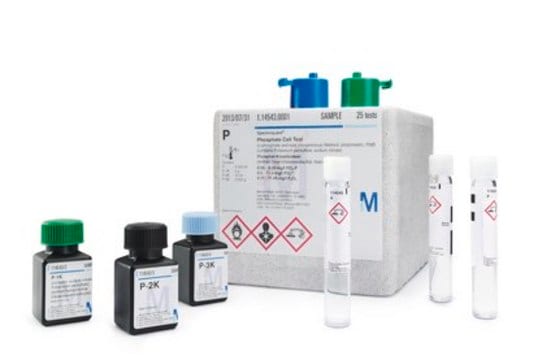1.09773
COD Cell Test (Hg-free)
photometric, 100-1500 mg/L (COD), Spectroquant®
About This Item
Recommended Products
product line
Spectroquant®
Quality Level
usage
sufficient for 25 tests
analyte functional class(es)
chemical oxygen demand (COD)
measuring range
100-1500 mg/L (COD)
technique(s)
photometry: suitable
compatibility
for use with Spectroquant® Move 100
for use with Spectroquant® Nova 60 A
for use with Spectroquant® Prove 100
for use with Spectroquant® Prove 300
for use with Spectroquant® Prove 600
detection method
photometric (Oxidation with chromosulfuric acid, determination as chromium(III))
storage temp.
15-25°C
General description
The Chemical Oxygen Demand (COD) is a measure for the amount of oxygen consumed during the oxidation of organic matter, which gives a clear indication for the quality of a water source, it is for sure one of the most important parameters in (waste) water analysis. Our Spectroquant® COD Tests allow you to accurately quantify the of COD levels in your sample.
These special Hg-free COD Test Kits require the samples to be free of Chloride to avoid interference and wrong results.
The Spectroquant® Cell Tests come with prefilled 16 mm round cells and all the required reagents to perform the analysis according to the instruction leaflet provided.
All Spectroquant® Cell and Reagent Test Kits are equipped with the unique Live ID (2D barcode), which allows seamless method recognition and contains essential information such as lot number, expiry date, and automatic calibration updates.
Application
- Pollutant removal in an experimental bioretention cell situated in a northern Chinese sponge city.: This study evaluates the efficiency of a bioretention cell in removing pollutants from urban runoff in a northern Chinese sponge city. The research highlights the importance of innovative green infrastructure in urban water management and pollution control (Shi et al., 2024).
- Treatment of diluted palm oil mill effluent (POME) synchronous with electricity production in a persulfate oxidant-promoted photocatalytic fuel cell.: This research explores a novel approach to treating diluted POME while generating electricity using a photocatalytic fuel cell. The study demonstrates the potential for integrating wastewater treatment with renewable energy production (Yap et al., 2023).
- Influence of Fe(2)O(3) and bacterial biofilms on Cu(II) distribution in a simulated aqueous solution: A feasibility study to sediments in the Pearl River Estuary (PR China).: The study investigates the role of iron oxide and bacterial biofilms in copper distribution in aqueous solutions, offering insights into sediment management and pollution control in estuarine environments (Kurniawan et al., 2023).
- Residual pollutants in treated pulp paper mill wastewater and their phytotoxicity and cytotoxicity in Allium cepa.: This paper examines the residual pollutants in treated wastewater from pulp paper mills and assesses their phytotoxic and cytotoxic effects using Allium cepa as a model organism, underlining the need for improved wastewater treatment processes (Sharma et al., 2021).
- Evaluating nitrite oxidizing organism survival under different nitrite concentrations.: The research evaluates the survival of nitrite-oxidizing organisms at varying nitrite concentrations, providing critical insights into the optimization of biological nitrogen removal processes in wastewater treatment (Liu et al., 2020).
Legal Information
Signal Word
Danger
Hazard Statements
Precautionary Statements
Hazard Classifications
Aquatic Acute 1 - Aquatic Chronic 1 - Carc. 1B - Eye Dam. 1 - Met. Corr. 1 - Muta. 1B - Repr. 1B - Skin Corr. 1A
Storage Class Code
6.1D - Non-combustible, acute toxic Cat.3 / toxic hazardous materials or hazardous materials causing chronic effects
WGK
WGK 3
Flash Point(F)
Not applicable
Flash Point(C)
Not applicable
Certificates of Analysis (COA)
Search for Certificates of Analysis (COA) by entering the products Lot/Batch Number. Lot and Batch Numbers can be found on a product’s label following the words ‘Lot’ or ‘Batch’.
Already Own This Product?
Find documentation for the products that you have recently purchased in the Document Library.
Our team of scientists has experience in all areas of research including Life Science, Material Science, Chemical Synthesis, Chromatography, Analytical and many others.
Contact Technical Service


